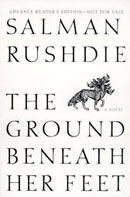|
REVIEW Rushdie's new novel The Ground Beneath Her Feet, with its 575 tiresome pages, confirms the earlier critique; moreover, it spreads ample new ground beneath his feet to trod while he assails the reader with massive verbiage straining to be comic. In this muddled melodramatic novel, Rushdie comes off as a wannabe Mel Brooks of contemporary literature -- an aspiration he can't achieve for he lacks the wit.
This novel is Rushdie's attempt to retell the Orpheus myth with both Orpheus and Eurydice recast as rock stars who start off as Indian kids in Bombay and later migrate to the West. The book is full of bloody murders: The protagonist's brother murders his parents and several other people; the second protagonist's mother murders her husband and all of her other children; the narrator's parents both commit suicide; the protagonists' music agent is murdered and their producer kills himself. The book opens with the second protagonist ready to give an interview at an estate of one of her fans in Tequila, Mexico, getting swallowed by the earth opening up in a gigantic quake.
Orpheus is Ormus Cama, son of an anglophilic Parsi family, an incredibly handsome and an incredibly gifted guitar player. The names of both Ormus and his dead twin, Gayomart, derive from their Zorastrian heritage. Obsessed with his dead twin, who, Ormus believes inhabits his body and informs his personality. Ormus is an incredible composite of Elvis, Lennon, Dylan, Bowie, and more. Eurydice isVina Apsara, of Greek-American and Asian-Indian parentage, and is incredibly beautiful. After spending her troublesome early childhood in the USA and becoming gruesomely orphaned at age 12, she goes to live in Bombay with the family of the narrator, Rai Merchant. The 9-year-old Rai falls in love with her. Soon, she meets the 19-year-old Ormus and the two incredibles fall in love. When she is 16, complicated subplots make her and Ormus lose contact with each other for ten years. She moves back to America and comes across Ormus again when his first record is released. The two create an incredibly successful rock band. Ormus proposes marriage which she rejects because she is loathe to give up her promiscuous lifestyle. Vina is followed to America by Rai Merchant, the narrator of the novel, a photographer by profession. Rai is one of the many paramours in Vina's numerous sexual escapades. Although a self-declared skeptic and rationalist, Rai frequently makes mythic references. Throughout the novel, Rai espouses views very similar to Rushdie's as published in his interviews.
A major new fault is Rushdie's repeated inflictions of mindboggling mythological references on the reader. Vina Apsara, for example, is not only an Indian demi-goddess as her name suggests but is also compared to Eurydice, Cinderella, Medusa, Rati, Helen of Troy, Athena, Psyche, Dionysius, and more! This excess, it would seem, is Rushdie's hope that even though he himself cannot the reader will somehow make sense of at least a few of these allusions. A second major fault is Rushdie's continual authorial intrusion. Although Rushdie tells the novel in the first person, his narrator gets inside other characters' head to deliver long pontifical soliloquies on death and art. A third major fault is Rushdie's failure to dramatize the conflicts of his characters; instead, he resorts to obtuse statements. For example, the narrator says: "The only leaps of faith I'm capable of are those required by the creative imagination, by fictions that don't pretend to be fact, and so end up telling the truth." The use of the term "end up" is utterly obtuse. The very best fiction reveals truth; mumbo jumbo, such as Rushdie's, not even after he prolongs it to 575 pages, can not "end up" telling the truth.
The book is replete with silly tricks. For example, Gayomart, the dead twin, reveals to Ormus songs like Beatles' "Yesterday" two years, eight months, and twenty-eight days before they are released in the West. Why 1001 days and not three years? Ah, Rushdie wants to allude to the Arabian Nights -- no matter how gratuitous the allusion. Another example: "They arrive in Delhi, to find the city in uproar. A quadruple assassination, by Sikh bodyguards, has resulted in the deaths of Indira Gandhi, both her sons, and ...." This false assertion (Indira Gandhi's younger son Sanjiv had died in a plane crash four years earlier; Rajiv, the elder son, was almost immediately sworn in as prime minister) typifies trickery that Rushdie uses repeatedly.
|
